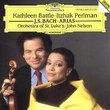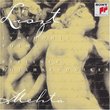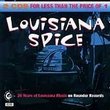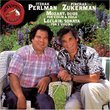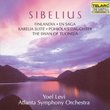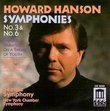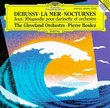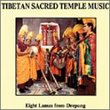| All Artists: Wolfgang Amadeus Mozart, Pinchas Zukerman, National Arts Centre Orchestra Title: Zukerman Conducts Mozart Members Wishing: 0 Total Copies: 0 Label: Cbc Original Release Date: 1/1/2003 Re-Release Date: 10/21/2003 Genre: Classical Styles: Chamber Music, Forms & Genres, Concertos, Serenades & Divertimentos, Instruments, Strings, Symphonies Number of Discs: 2 SwapaCD Credits: 2 UPC: 059582523025 |
Search - Wolfgang Amadeus Mozart, Pinchas Zukerman, National Arts Centre Orchestra :: Zukerman Conducts Mozart
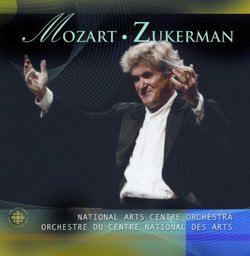 | Wolfgang Amadeus Mozart, Pinchas Zukerman, National Arts Centre Orchestra Zukerman Conducts Mozart Genre: Classical
This new double CD release of Wolfgang Amadeus Mozart features both the orchestral and chamber music prowess of Canada?s NATIONAL ARTS CENTRE ORCHESTRA under the artistic direction PINCHAS ZUKERMAN. The Mozart is the lates... more » |
Larger Image |
CD DetailsSynopsis
Album Description This new double CD release of Wolfgang Amadeus Mozart features both the orchestral and chamber music prowess of Canada?s NATIONAL ARTS CENTRE ORCHESTRA under the artistic direction PINCHAS ZUKERMAN. The Mozart is the latest release in a remarkable series on CBC Records, with this group that began with Vivaldi four years ago and followed thereafter with CDs featuring the music of Beethoven (2001) and then Schubert (2002). As was the case in all of these recordings, Zukerman conducts and plays. Similarly Requested CDs
|
CD ReviewsA MOZART FEAST J Scott Morrison | Middlebury VT, USA | 10/30/2003 (5 out of 5 stars) "The first time I ever heard Pinchas Zukerman play it was in Mozart--as the spectacularly talented violist in the string trio, Divertimento in E Flat, K. 563; Itzhak Perlman was the violinist, Ronald Leonard (former principal of the LA Philharmonic) the cellist. And I've heard him play and conduct music of Mozart several times since. It has always seemed to me that he has a special feel for it.This 2 CD set is devoted entirely to Mozart, with music from several different genres: a string orchestra divertimento, his earliest mature symphony, one of his violin concertos, the glorious G minor string quintet, and the clarinet quintet. It's hard to imagine a more lovely program than this: two-and-a-quarter hours of heavenly music played beautifully. For the last few years Zukerman has been the music director of the National Arts Centre Orchestra in Ottawa, and all the musicians in this set are his colleagues there. There is not a well-know (to me) name amongst them, but the musicianship demonstrated in these performances is of the highest level. Zukerman conducts, plays the violin solo in the concerto and the lead violin in the chamber pieces. I have to say that the last couple of times I'd heard him perform in person it seemed that he was more or less phoning in his performance. Not this time. His velvety tone, hair-trigger technique and subtle phrasing is present throughout. And he gets remarkable ensemble from his players, in both the orchestral and the chamber pieces.A few words about some of the high points in this otherwise consistently high-level set: The initial statement and return of the rondo theme in the third movement of the Fifth Violin Concerto in A Major, K. 219, is meltingly played. The third movement allegro of the Divertimento in D Major, K. 136, displays real virtuosity in all of the strings, with dancing sprung rhythms; the fugal passages feature clarity and élan.Many conductors present the Symphony No. 29 in A, K. 201, as if it were a bijou, a trifle. It certainly some of that quality about it, but it also represents the 18-year-old Mozart's first mature essay in the symphonic form and there are formal and harmonic features--as in the development of the first movement--that are as advanced and as serious as anything Mozart ever wrote. Zukerman's orchestra catches that quality. The second movement has one of Mozart's loveliest melodies, with an equally lovely countermelody riding above it in the high violins. The orchestra plays it sensuously, not hurrying it, allowing us to luxuriate in it. The symphony's fourth movement has always been one of my favorites in all of Mozart; there is vigor, excitement and rakish humor, almost Haydnesque. Zukerman apparently feels it that way, too. I approve.The G Minor String Quintet, K. 516, is generally considered not only the finest of Mozart's quintets, but possibly the finest ever written. The instrumentalists--Zukerman and Jessica Linnebach, violins, Jethro Marks and Donnie Deacon, violas, and Amanda Forsyth, cello--play at the highest international level. I honestly cannot find anything to criticize. Hear how they put forth the drama of the first movement, emphasize the off-beat accents in the second so that we are kept off-balance (surely that's what Mozart wanted, no?), sing the third movement as if members of a world-class choir. The adagio first section of the fourth movement will tear your heart out; Zukerman sings the melancholy violin theme in such a sweetly hushed tone, over the soft sobbing of the other strings, that you don't want it to end--it almost makes time stand still. Any doubt Mozart that was a genius disappears here. And then follows the allegro in the sunniest G major; it takes a moment to shake off the melancholy of the adagio, but once the rhythm is firmly established, Mozart has makes us forget the melancholy and the whole thing comes to a rollicking end. Bravo.The set comes to an end with the glorious Clarinet Quintet in A Major, K. 581, the chamber companion to his later well-beloved clarinet concerto, both written for Mozart's favorite clarinetist, Anton Stadler; indeed this quintet is usually subtitled 'Stadler.' Kimball Sykes is the fine and sensitive clarinetist here; I don't think there is anything he can't do with his instrument. His legato is molten gold. Zukerman plays first violin; Deacon moves to the second violin stand, Jane Logan is the violist, and Forsyth is again the cellist. Again, the playing is world-class. What can one say about this piece? It is certainly one of my desert island works. I remember an episode of the TV show M*A*S*H where Major Charles Emerson Winchester tries to teach some rag-tag Chinese musicians the quintet. I can identify with that attempt. This is music one should not be away from for very long, even in a war-torn area. I must have ten recordings of the piece. This one is one of the best.In summary, this is a 2 CD set that has not a single weak moment. It contains some of the most divine music ever written in performances that measure up to the best.A very strong recommendation.Scott Morrison" National Arts Centre Orchestra of Ottawa with Pinchas Zukerm Adam Bigham | Michigan, USA | 09/25/2005 (5 out of 5 stars) "This two-disc set contains Divertimento for Strings in D, K.136; Violin Concerto no. 5 in A, K.219; Symphony no. 29 in A, K.201; String Quintet in g minor, K.516; Clarinet Quintet in A, K.581.
On the chamber works, Mr. Zukerman plays first violin (and he is the soloist in K.219.) Other players in K.516 are: Jessica Linnebach, violin; Jethro Marks, viola; Donnie Deacon, viola; Amanda Forsyth, cello. The others in K.581 are: Kimball Sykes, clarinet; Donnie Deacon, violin; Jane Logan, viola; Amanda Forsyth, cello. Recorded on July 12, 2002 and July 10-12, 2003 in Southam Hall, National Arts Centre, Ottawa (Canada's capital city), this mid-priced set is worth every cent. The NACO players are excellent in both the orchestral and chamber works. In the latter, they are equal and astute partners with Mr. Zukerman, and this recording of the Clarinet Quintet is one of the finest I have heard (among many, it being my favorite Mozart work.) Recommended without hesitation." |

 Track Listings (10) - Disc #1
Track Listings (10) - Disc #1
